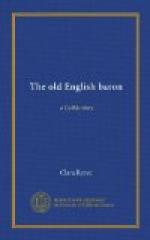“I instantly dispatched my two emissaries to intercept him on the way. He made so much haste to return, that he was met within a mile of his own castle; he had out-rode his servants, and was alone. They killed him, and drew him aside out of the highway. They then came to me with all speed, and desired my orders; it was then about sunset. I sent them back to fetch the dead body, which they brought privately into the castle: they tied it neck and heels, and put it into a trunk, which they buried under the floor in the closet you mentioned. The sight of the body stung me to the heart; I then felt the pangs of remorse, but it was too late; I took every precaution that prudence suggested to prevent the discovery; but nothing can be concealed from the eye of Heaven.
“From that fatal hour I have never known peace, always in fear of something impending to discover my guilt, and to bring me to shame; at length I am overtaken by justice. I am brought to a severe reckoning here, and I dread to meet one more severe hereafter.”
“Enough,” said the priest; “you have done a good work, my son! trust in the Lord; and, now this burden is off your mind, the rest will be made easy to you.”
Lord Lovel took a minute’s repose, and then went on.
“I hope by the hint you gave, Sir Philip, the poor lady is yet alive?”
“No, sir, she is not; but she died not till after she brought forth a son, whom Heaven made its instrument to discover and avenge the death of both his parents.”
“They are well avenged!” said he. “I have no children to lament for me; all mine have been taken from me in the bloom of youth; only one daughter lived to be twelve years old; I intended her for a wife for one of my nephews, but within three months I have buried her.” He sighed, wept, and was silent.
The gentlemen present lifted up their hands and eyes to Heaven in silence.
“The will of Heaven be obeyed!” said the priest. “My penitent hath confessed all; what more would you require?”
“That he make atonement,” said Sir Philip; “that he surrender the title and estate to the right heir, and dispose of his own proper fortune to his nearest relations, and resign himself to penitence and preparation for a future state. For this time I leave him with you, father, and will join my prayers with yours for his repentance.”
So saying, he left the room, and was followed by the Barons and the surgeon; the priest alone remaining with him. As soon as they were out of hearing, Sir Philip questioned the surgeon concerning his patient’s situation; who answered, that at present he saw no signs of immediate danger, but he could not yet pronounce that there was none.
“If he were mortally wounded,” said he, “he could not be so well, nor speak so long without faintness; and it is my opinion that he will soon recover, if nothing happens to retard the cure.”
“Then,” said Sir Philip, “keep this opinion from him; for I would suffer the fear of death to operate on him until he hath performed some necessary acts of justice. Let it only be known to these noblemen, upon whose honour I can rely, and I trust they will approve my request to you, sir.”




